January 2025
The global language translation device market size was USD 1.35 billion in 2023, calculated at USD 1.49 billion in 2024 and is expected to be worth around USD 4.02 billion by 2034. The market is slated to expand at 10.42% CAGR from 2024 to 2034.
The global language translation device market size is worth around USD 1.49 billion in 2024 and is anticipated to reach around USD 4.02 billion by 2034, growing at a CAGR of 10.42% over the forecast period 2024 to 2034. The North America language translation device market size reached USD 510 million in 2023. The rapid growth in the tourism industry is driving demand for language translation devices. Many tourist attractions are adopting these devices, which helps enhance the consumer experience and fuel the language translation device market growth.
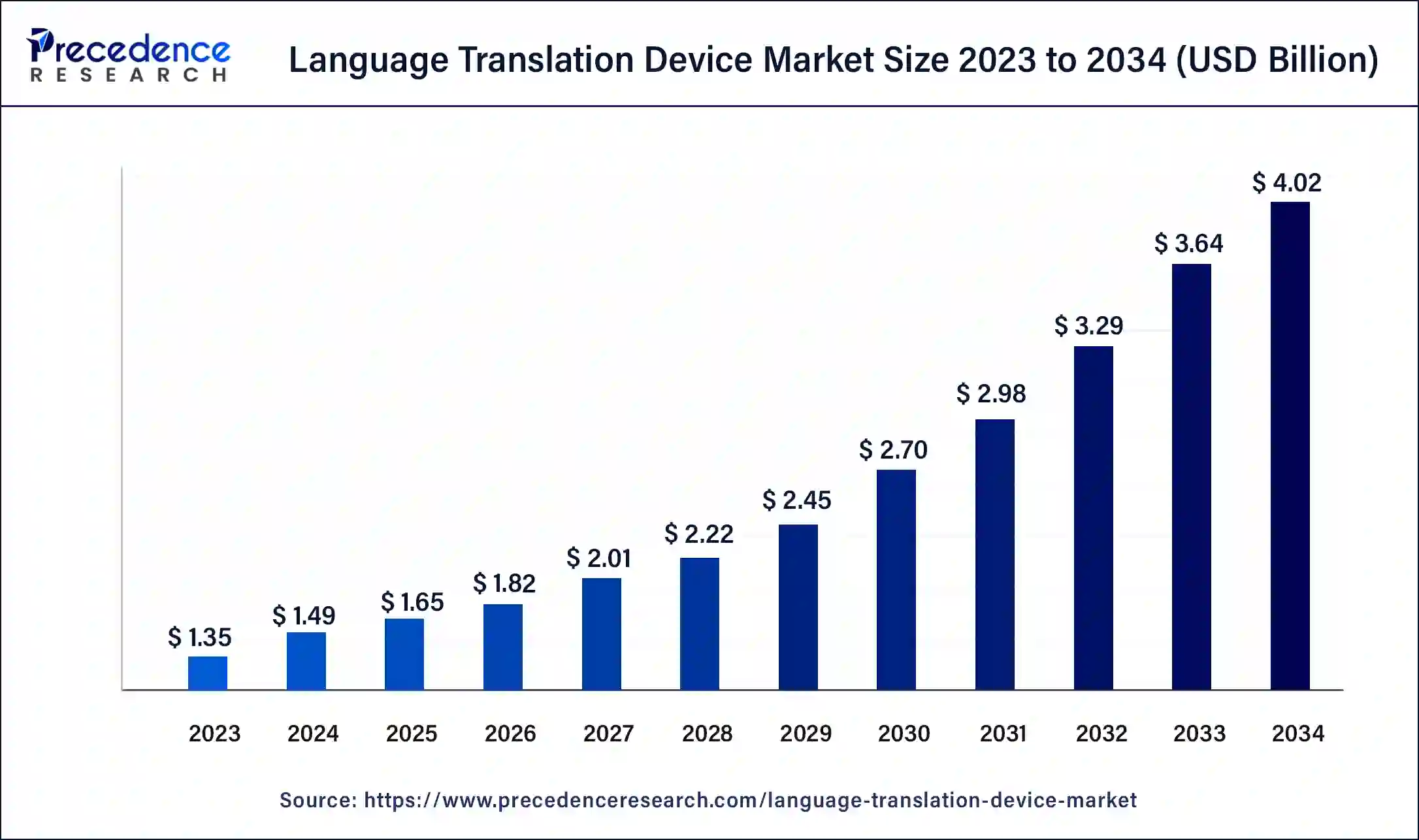
The global U.S. language translation device market size was exhibited at USD 380 million in 2023 and is projected to cross around USD 1170 million by 2034, poised to grow at a CAGR of 10.76% over the forecast period 2024 to 2034.
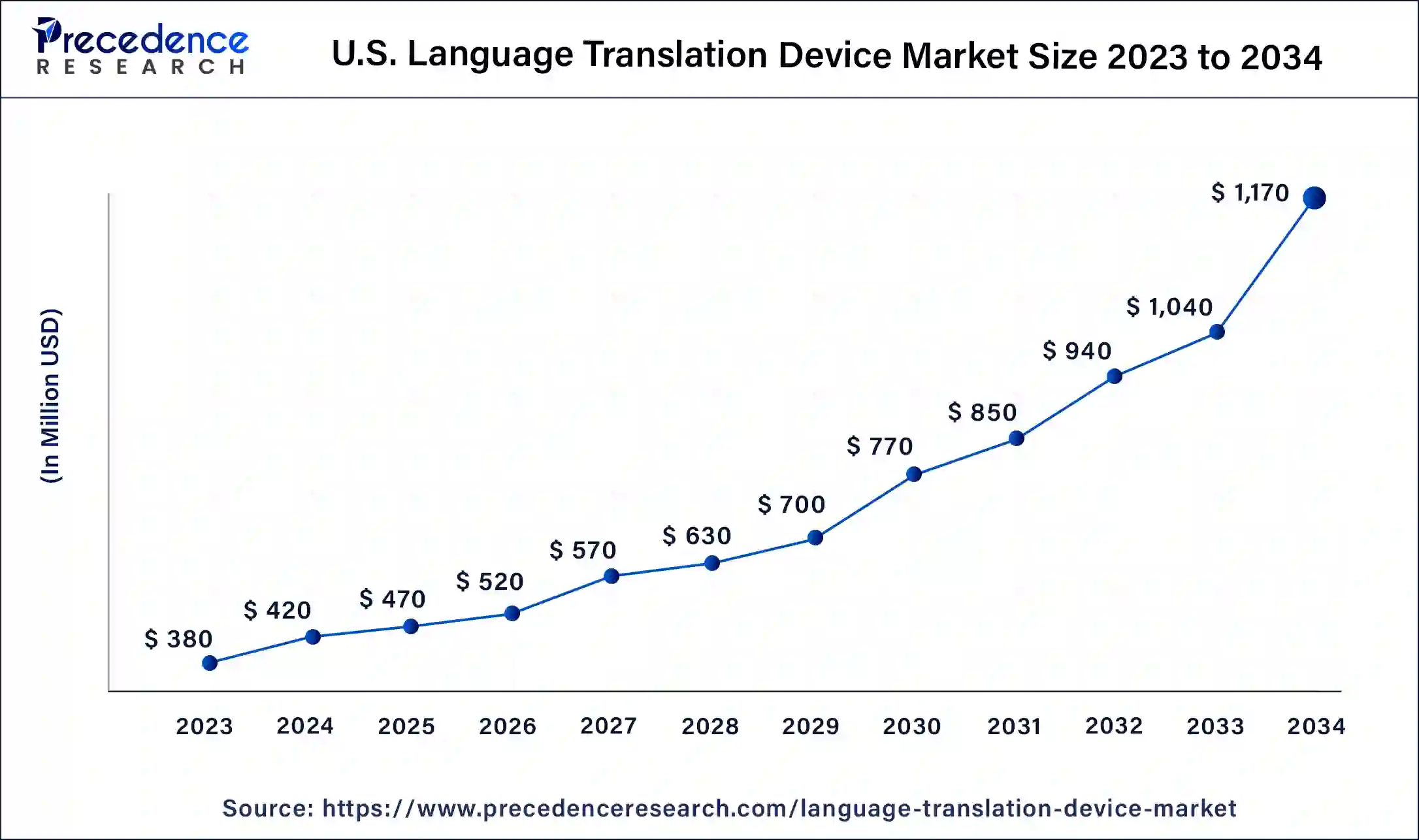
North America dominated the global language translation device market in 2023. The dominance of the region is attributed to the well-established technological infrastructure in countries like the United States and Canada. The region is home to many technological innovations that are dominant all over the world. Countries like the United States and Canada also witness many immigrants from all over the world which raises the demand for the market services.
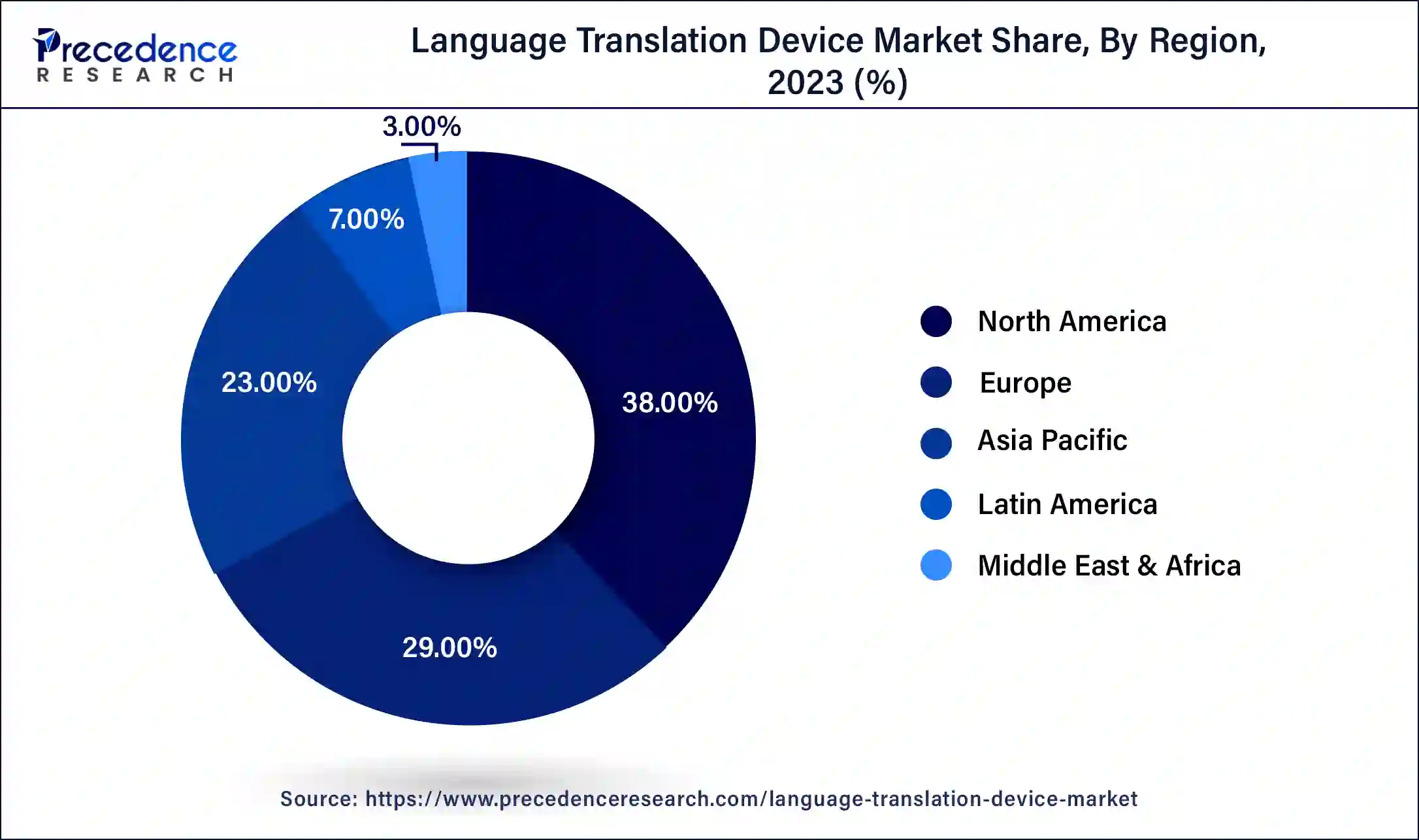
Asia Pacific is anticipated to host the fastest-growing language translation device market during the forecast period of 2024 to 2034. Asian countries like India, China, and Japan are cheap compared to the other regions, which have many tourists from Europe and North America. The rise of social media has played a vital role in promoting the growth of the region. These countries are also witnessing rapid urbanization, which attracts many industries from other regions. As a result, these governments are increasing their focus on adopting the use of translation devices, which help tourists gain a smooth travel experience. Many countries are offering visa-free visits to promote their tourism industry.
Language Translation Device Market Trends in Asia
A language translation device is an electronic tool that helps translate a written or spoken language from one language to another. The device has features containing speech recognition technology that identifies the spoken language and helps convert it into another. The language translation device market is experiencing significant growth due to its rising demand in business sectors, which can help smoothen multilingual conversations. The device also plays a vital role in strengthening countries' relationships, potentially boosting the demand of multiple business sectors.
Spain stands out as one of the major countries in the language translation device market, witnessing multiple tourists annually. This increases the demand for language translation devices which helps them in eliminating the communication barrier.
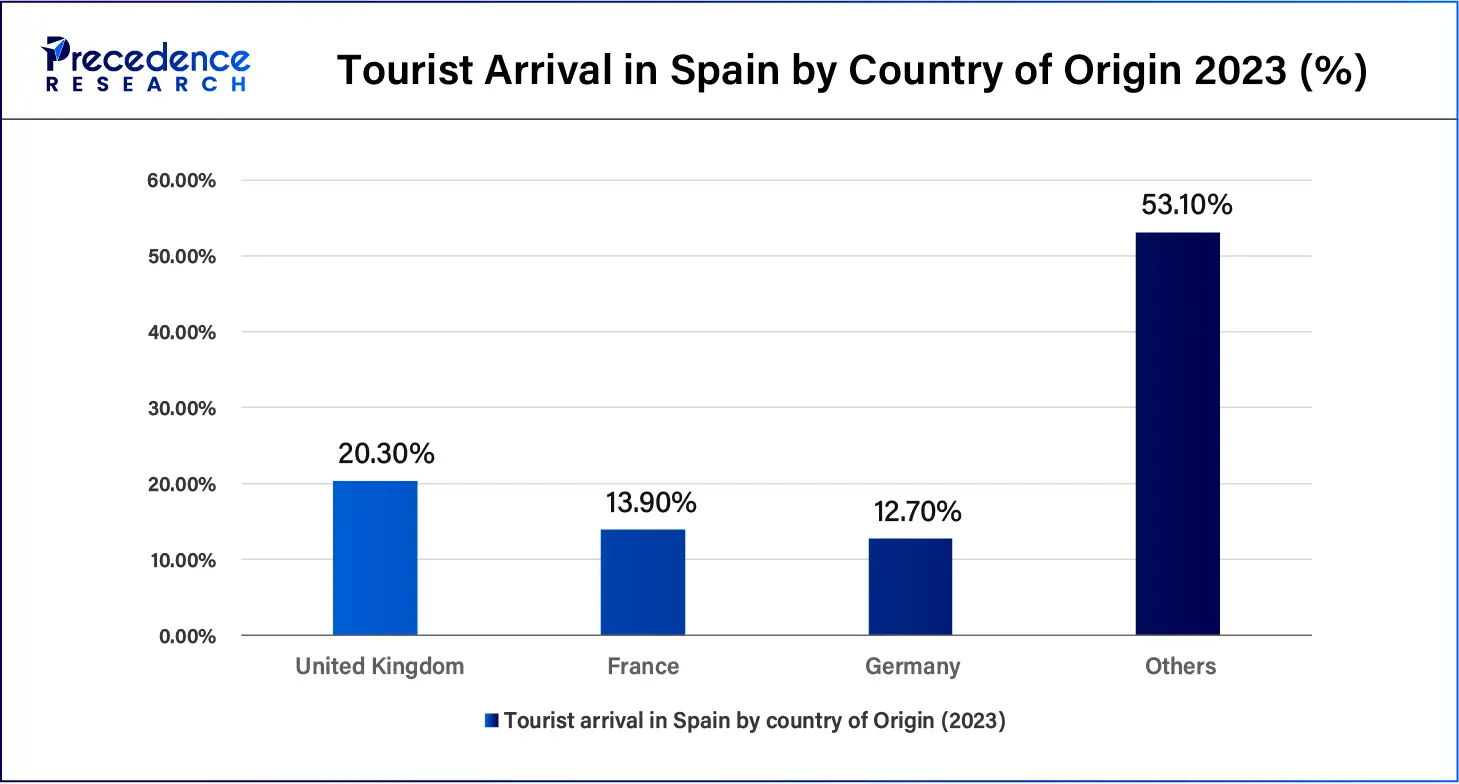
How AI is Revolutionizing the Language Translation Device Market?
The emergence of technologies like artificial intelligence (AI) has been playing a significant role in the development of the language translation device market. Technologies like ML and NLP contribute towards enhancing translation by absorbing the data and improving the real-time translation process. AI algorithms are also capable of analyzing huge datasets, which can improve the translation by analyzing the context of the sentences. The use of AI is also increasing in corporate settings, which develop software that can analyze and translate complex sentences in a short time. The implementation of these technologies is increasing the service speed.
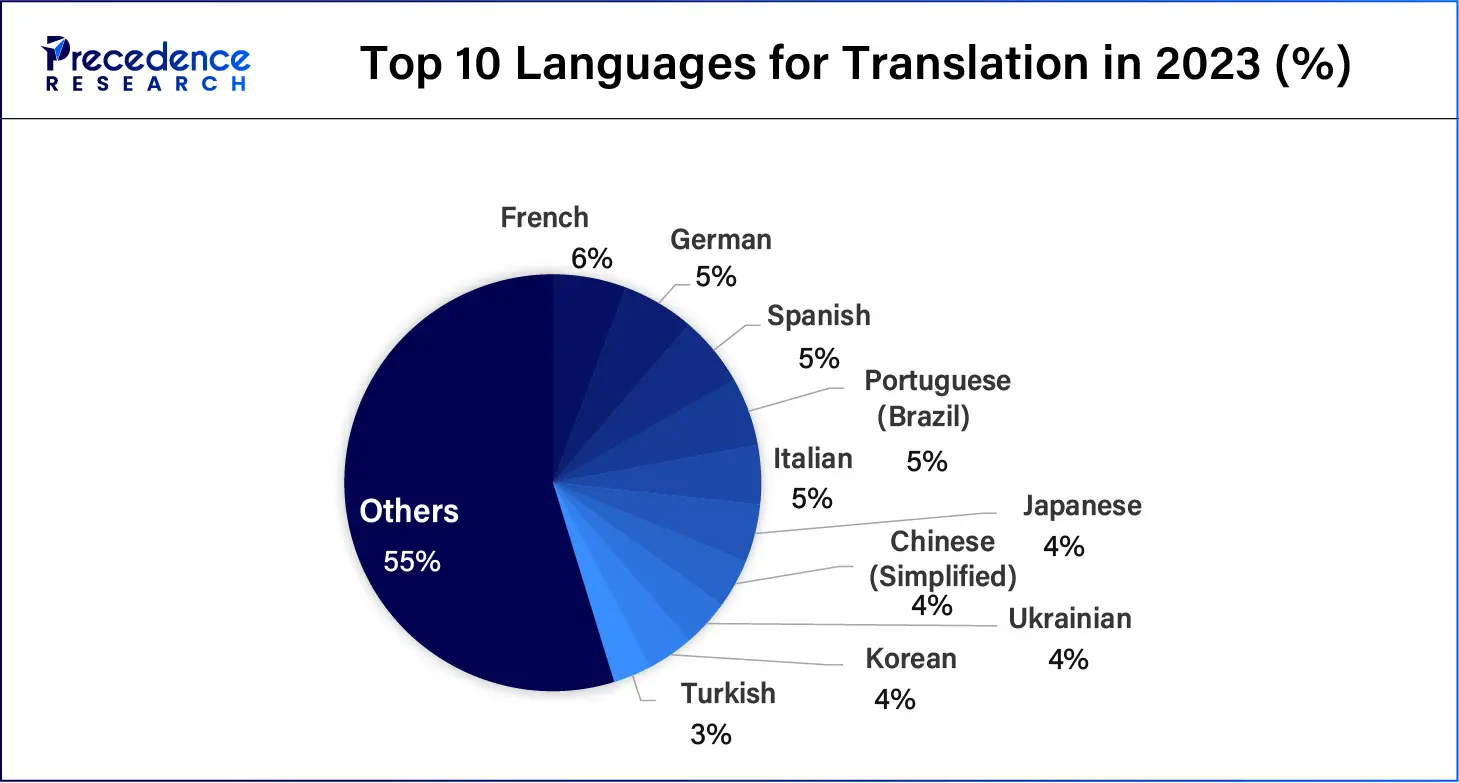
| Report Coverage | Details |
| Market Size by 2034 | USD 4.02 Billion |
| Market Size in 2023 | USD 1.35 Billion |
| Market Size in 2024 | USD 1.49 Billion |
| Market Growth Rate from 2024 to 2034 | CAGR of 10.42% |
| Largest Market | North America |
| Base Year | 2023 |
| Forecast Period | 2024 to 2034 |
| Segments Covered | Product, Type, Application and Regions |
| Regions Covered | North America, Europe, Asia-Pacific, Latin America and Middle East & Africa |
Rapid growth in international business
The rapid growth in technologies is leading to the adoption of employees and clients from other countries too. To maintain smooth communication in the organization, companies are adopting the use of translation devices which helps them in growing the demand for language translation device market. These tools play a vital role in providing real-time assistance in formal meetings, interviews, and seminars.
Rising travel and tourism
The COVID-19 period severely affected global tourism, which affected multiple industries; the people were also isolated in their homes. This resulted in the need for vacations, which significantly boosted the tourism industry. The rapidly growing number of international tourists usually encounter communication issues while traveling. This raises the need for language translation device market services that help them translate one language into another.
Higher costs
The language translation device market has been witnessing significant growth in recent years, but there are still some concerns that tend to hamper the market growth. The advanced cost of these AI-integrated devices leads to a higher rate of the devices due to their complexity in production. These advanced features also require timely updates, which makes them expensive. This makes it less affordable in low-income countries.
Increasing multilingual education
The rising trend of education across borders leads to investment in developing language translation tools. They help eliminate language barriers by providing voice or text-based translations. The rising initiatives from international organizations like fellowships and scholarships also promote multilingual education and increase the demand for the language translation device market.
Increasing technological advancements
The adoption of the language translation device market in multiple industries leads to changing consumer preferences, which require timely solutions and advancements. For example, the rising use of wearable devices like smart earbuds and smartwatches offers a comfortable experience to users without the need for any handheld device. This results in rising investments in the improvement of voice recognition technologies that can analyze the context and accent of the conversation.
The handheld device segment held the dominant share of the language translation device market in 2023. Handheld language translation devices are gadgets that help in real-time translation. The dominance of the segment is attributed to its portability, which helps carry the device without any issues. These devices are commonly used by travelers, and they can help them by providing real-time translation. The travel and tourism industry has been witnessing massive growth post-COVID-19, which is leading to the increasing demand for handheld devices. Additionally, some of the devices offer offline translation, which plays an important role in areas without access to the internet.
The wearable device segment is expected to register notable growth in the language translation device market during the forecast period. The segment's growth is attributed to the rising use of smart devices like earbuds and watches worn or attached to the body. The rising use of these devices is leading to multiple advancements that track real-time conversations and help in translating them. These devices are more suitable in professional settings like meetings or seminars. Additionally, the rising technologies help improve connectivity with mobile phones and laptops, which can provide services without the need for physical presence.
Samsung showcased an AI-based translation tool for wearable devices and smartphones at the Paris 2024 Olympics. This helped the athletes to execute multilingual conversations. Products like Galaxy Buds 3 offer advanced translation features to understand the language spoken.
The online translation segment registered the largest share of the language translation device market in 2023. These services require internet connectivity. The internet advances the experience as it can provide timely updates, which helps maintain translation accuracy. The use of the internet also helps to provide services in multiple languages. The travel industry is one of the major growth contributors, as many people use these services to navigate travel spots and hotels.
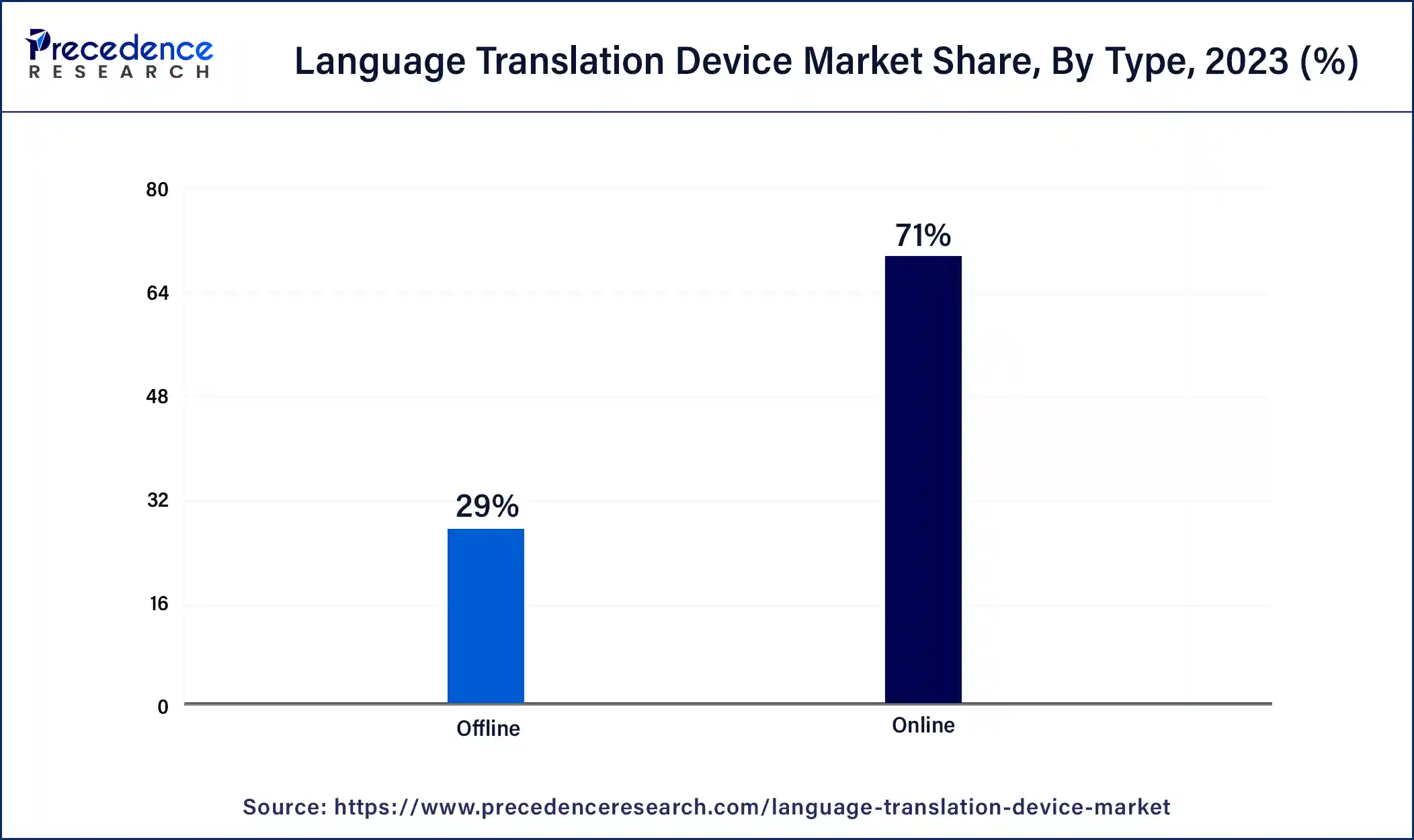
The offline translation segment is expected to witness significant growth in the language translation device market from 2024 to 2034. The growth of the segment is attributed to the rising number of travellers who require translation devices in remote areas where they face network issues. The rise in health tourism drives the demand for offline translation, which provides quick healthcare solutions in the absence of the internet. For instance, Mortentr offers a voice translator device that provides 114 languages offline and online.
The commercial segment held the largest share of the language translation device market in 2023. The segment includes the use of language translation devices in businesses, retail, and tourism to improve their communication process without any barriers. The rising globalization has provided many opportunities for businesses, which has increased the need for translation devices while connecting with people from other countries. The rising tourism also leads to the rising adoption of these devices in commercial settings like hotels, restaurants, and transport. Governments are also taking initiatives to adopt these devices in their customer service, which would provide a smooth experience for the people.
Segments Covered in the Report
By Product
By Type
By Application
By Geography
For inquiries regarding discounts, bulk purchases, or customization requests, please contact us at sales@precedenceresearch.com
No cookie-cutter, only authentic analysis – take the 1st step to become a Precedence Research client
January 2025
December 2024
July 2024
July 2024